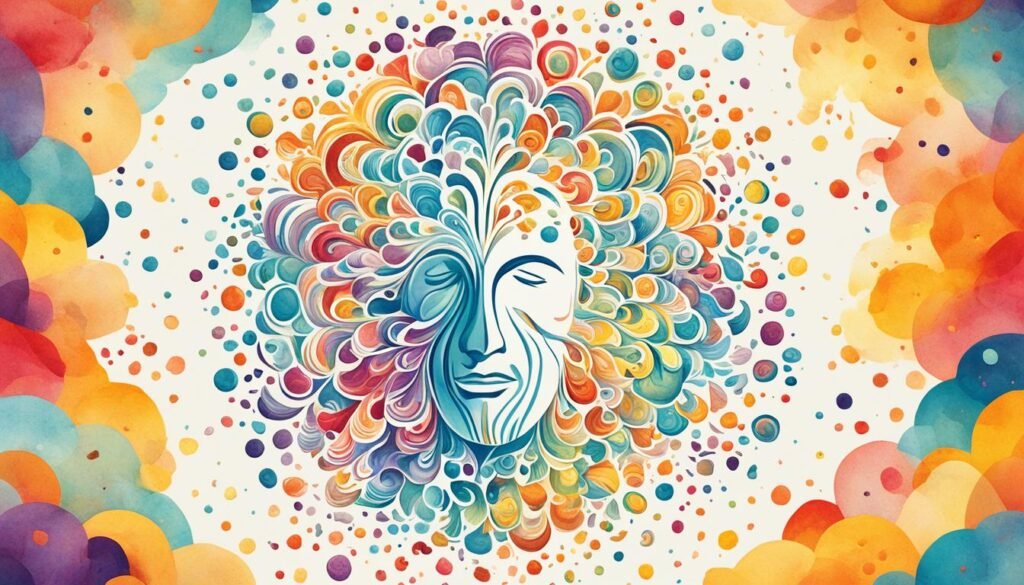In today’s fast world, finding emotional balance is hard. But, research suggests that mindfulness is beneficial. Mindfulness means being completely in the moment. It means being present in the moment. It involves a keen awareness. This helps us handle life’s challenges. It helps us do so better.
This article will share 5 mindfulness techniques. They can make you feel more peaceful, calm, and stable inside.
Emotional balance is important. It is key to our well-being. But it’s hard in a world full of distractions and stress. Mindfulness can help you control your feelings. It can also help you understand yourself.
These techniques can help you deal with stress, anxiety, or the ups and downs. They offer a strong way to find emotional balance and resilience.

What is Mindfulness?
Mindfulness is a way to focus on the present moment, without judgment. It’s a kind of meditation. It helps people notice their thoughts. It also helps them notice their feelings and their body. They also notice their feelings. They tune into their physical feelings. They do this without getting caught in stories or judgments. This way, it helps people deal with stress better. They gain clarity and emotional balance.
The definition of mindfulness is being aware. It means being aware of the present moment. It means being aware without judgment. It’s a practice that helps people watch their lives unfold. They watch as they happen. They don’t get lost in the past or worrying about the future. This shows that presence is essential. It is the state of being. You must accept thoughts and feelings. You must do so without bias.
Mindfulness practice helps people understand their minds. They learn to cope with life’s challenges. They do so with greater emotional stability. By focusing on the breath or body, it keeps the mind in the present moment. This brings a sense of calm and clarity.
Humans have the capacity to exist in the moment. They possess an innate talent. We are aware of where we are and what we’re doing. We maintain our composure amidst surrounding circumstances.
Benefits of Mindfulness
Mindfulness means being fully in the moment. It helps us feel better overall. Studies show it’s good for our mental health and more.
Improved Mood
Mindfulness helps us notice our thoughts. It also helps us notice our feelings. This makes us better at handling stress and staying happy. It can make us feel less sad and anxious, and more joyful.
Increased Self-Awareness
Being mindful helps us know ourselves better. We learn more about our thoughts and actions. This can help us grow and make better choices.
Enhanced Focus and Concentration
Mindfulness makes us better at paying attention. It helps us stay focused and think more clearly. This enables us to work more effectively. It helps us solve problems more easily.
Mindfulness is good for us and those around us. It makes our relationships and health better. It brings us balance and happiness.
Mindfulness is complete awareness. It is of the present moment. You should do this without getting caught in judgments. You should also avoid reactivity.” – Jon Kabat-Zinn
Mindfulness Exercises
Cultivating mindfulness is a journey. There are many exercises that can help you. These include body scan meditation. They also include sitting and walking meditation. They also include practices to help you notice the present. They help you balance your emotions.
Body Scan Meditation
This meditation makes you focus on specific body parts. It helps you relax and not judge yourself. It makes you more aware of your body and the present moment.
Sitting Meditation
Sitting meditation helps you focus on your breath. It keeps your mind in the present moment. This practice makes you more focused. It also makes you less stressed and happier.
Walking Meditation
Walking meditation makes you mindful. It does so while you walk. It helps you notice your body moving. This can make you less anxious, happier, and more thankful for now.
These exercises help you add mindfulness to your life. They offer different ways to practice. Each one has its own benefits for a balanced and happy life.

Mindfulness is not a chore, it’s a way of being. By doing these exercises, you can unlock the power of the present moment. You can also find a deeper peace and purpose in your life.
Emotional Balance: Navigating Life’s Challenges
Life can be tough, with lots of stress and hard times. But mindfulness can help. It lets us think before we act, making better choices.
When things get tough, as during COVID-19, we might feel sad. We might also feel angry or anxious. Emotional intelligence is key. It helps us understand our feelings. It also helps us handle others’ feelings.
- Develop self-awareness. Pay attention to your thoughts, feelings, and body. This will help you understand how you feel.
- Practice self-regulation. Keep your feelings and actions in check. Do this even when things get tough.
- Cultivate empathy. Learn to see from others’ viewpoints. This builds stronger bonds and support.
Use these tips to keep your emotions balanced. They will help you handle life’s surprises. View challenges as opportunities to grow. See them as opportunities to learn. Mindfulness and regulating your emotions are crucial. They are essential for a happy and fulfilling life.
The best weapon against stress is our choice to pick one thought over another. – William James

Regular physical activity promotes emotional stability. Also, be mindful. And, stay close to friends. Taking care of yourself helps you face life’s ups and downs. This way, you keep steady emotions. You do this even when things get tough.
Mindfulness and Stress Reduction
Today, stress is a big problem that affects our health. Yet, mindfulness can help. It makes us better at handling stress.
By finding stressors and being aware. We can handle life’s challenges better. This helps us to stay calm and clear-headed.
A study found that 66% of American workers can’t sleep. They have stress. The 2019 Stress in America Survey showed that stress is getting worse. Stress can harm our bodies. It raises our blood pressure and heart rate.
This can lead to health issues such as obesity and heart disease.
Identifying Stressors
To manage stress with mindfulness, we need to know what stresses us out. Look at work. Look at relationships. Look at money worries or other things that overwhelm us. Knowing what stresses us out helps us find ways to deal with it.
Cultivating Awareness
After finding our stress, mindfulness helps us stay in the moment. This makes us better at handling our feelings and lowers our stress. Studies show mindfulness makes us stronger. It also helps us cope better with our emotions.
It keeps us in the present. Instead of worrying about the future or past, we stay mindful. This helps us handle stressful situations better. It makes us feel better.

Integrating Mindfulness into Daily Life
Formal mindfulness practices like meditation are great. But it’s also key to add mindfulness to everyday tasks. By doing so, you become more aware of the present moment. It even helps to clear out your emotional state.
One easy way to be mindful is through mindful eating. Savor each bite. Focus completely on the flavors and textures. Notice how it tastes, smells, and feels. This can lead to better eating habits and a more enjoyable time eating.
Adding mindful movement to your day is another good idea. This can be yoga, walking, or even cleaning. It helps connect your body, mind, and nervous system. This makes any activity a chance to be mindful. It improves focus and happiness.
Adding mindfulness routines to your day can also help. Try taking deep breaths or setting an intention. Studies show that being mindful during daily activities can make you think. This is especially true when things get tough. It helps you act on purpose, not by habit.
Practicing mindfulness helps people to learn. They learn to be aware of the present moment. This brings more emotional balance to their lives.
It’s important to find mindfulness habits that fit you. This could be a short meditation, a mindful walk, or a few deep breaths. Adding mindfulness to your life often improves your mood a lot. It also improves your quality of life.

Mindfulness and Relationships
Mindfulness makes us pay attention and be present in the moment. It helps our relationships a lot. It enhances our communication. And it helps us empathize more with others.
Improving Communication
Being present helps us listen. It also helps us understand better. Mindfulness tells us to drop distractions. This makes our conversations deeper. It also makes them more joyful.
Cultivating Empathy
Mindfulness helps us know ourselves better. This helps us feel more compassion for others. We start to notice how others feel, making us kinder.
Studies show that mindfulness helps our relationships. It fosters clear communication. It builds caring bonds and strong relationships. Mindfulness improves our connections. Incorporating it into our lives does so. It makes them better.

Mindfulness helps us pause. We use it to reflect and respond with care and wisdom. We craft deliberate responses. This changes our relationships. It makes them more meaningful and rewarding.
It takes time and effort to add mindfulness to our relationships. But it’s worth it. By being present, we bond well. We talk well and feel for others. This makes strong, lasting bonds. These bonds help us feel balanced and happy.
Overcoming Obstacles to Mindfulness
Some people find it hard to start a mindfulness practice. They might struggle to quiet their minds. They feel they lack time. They also find changing their thoughts difficult. It’s key to be kind to yourself as you try. Remember, getting better at mindfulness takes time.
Research shows that stress, tiredness, or hunger can stop mindfulness. Feeling stressed can make it difficult to focus. Being very tired also makes it challenging to stay in the moment.
- Stress and exhaustion can make it difficult to stay mindful.
- Hunger and emotions can pull your focus away.
- Pain, rushing, and addictive behaviors can get in the way.
- Getting lost in your thoughts can make it difficult to be mindful.
To overcome these obstacles, you must be kind to yourself. Meditation and body scans can help. Adding mindfulness to one’s daily life helps. Getting help from a coach or therapist can also make a big difference.
The best way to beat stress is to pick one thought over another.” – William James

Emotional Balance and Self-Compassion
Self-compassion is the key to emotional balance. Mindfulness helps us be present and aware. It’s a strong tool for being kind to ourselves.
Being kind to ourselves makes us strong. This helps us stay calm and strong, even when things get tough.
Dr. Kristin Neff says self-compassion has three parts. They are: being kind. They are feeling connected. These are being mindful. It is essential that we treat ourselves with kindness. This involves refraining from using harsh language. It also means being compassionate. This ultimately leads to our better well-being. It fosters personal growth.
People who are kind to themselves feel happier and more hopeful. They are more perceptive about their feelings. They are also kinder to others. They take better care of themselves. As a result, they tend to stay healthier.
Self-compassion is not self-pity or self-indulgence. It is a way of relating to ourselves with kindness, care, and understanding. This is true even in the face of our flaws and shortcomings.” – Dr. Kristin Neff
Not being kind to ourselves can make us feel bad. It can lead to shame, feeling out of control, and even thinking about ending our lives. It can also make us stressed, lonely, and hopeless.
Learning to be kind and mindful helps us handle life better. This makes us take better care of ourselves. It helps us do well in our jobs, with friends, and in our personal lives.

Mindfulness and Neuroscience
Mindfulness is a significant topic in neuroscience. It illustrates how it alters the brain’s function. It also facilitates the regulation of emotions. It also helps people manage their feelings. It enables the brain’s plasticity. It helps control emotions. It does this by linking different parts of the brain.
Brain Plasticity
10 minutes of mindfulness can make us feel less upset. Meditating long-term reduces stress. It also makes us less reactive to feelings.
Emotional Regulation
Mindfulness changes the brain. It makes us more aware and better at making choices. It helps us handle emotions better. It also makes us feel happy and motivated by releasing good chemicals in the brain.
Mindfulness meditation affects the brain. It does this along the HPA axis. It has a positive effect on the body’s response to stress.
Mindfulness makes some brain areas larger. It enlarges the hippocampus. This helps with memory. It also helps with thinking and feeling emotions. Moreover, it shrinks the amygdala. The amygdala is the fear center. This leads to better feelings and brain chemistry.
Practicing mindfulness for 12 minutes a day has big benefits. It brings balance, calm, and greater connection.
Mindfulness in Therapy
Many therapies now include mindfulness practices. They help with mental health issues. Therapies like Mindfulness-Based Stress Reduction (MBSR) and Dialectical Behavior Therapy (DBT) use mindfulness. They help people understand themselves. They also help them manage their emotions. They also help them resolve problems.
These therapies work well for depression. They also work well for anxiety and trauma. They teach people to live in the present and accept things as they are. This helps them handle life’s ups and downs better.
Studies show that mindfulness changes the brain. It helps with feelings, focus, and being kind to oneself. These therapies help with many mental problems. They include depression, anxiety, and PTSD. They help with anxiety. They also help with depression. They also help with other conditions. This includes drug abuse. It also includes eating disorders. It also includes personality disorders.
Healthcare workers are now using mindfulness more. They see how it helps people. Therapists help clients understand their feelings. They do this using mindfulness. They learn to deal with stress, anxiety, and other issues.
Mindfulness is not about getting somewhere else. Exist in the current instant. Do so without distraction or mental wandering.
The use of mindfulness in therapy is getting bigger. It’s a key tool for feeling better and being happy.
Mindfulness and Physical Health
Mindfulness is being in the current moment. It means accepting reality as it is. It helps with mental and emotional health. It also helps with our physical bodies. Studies show how mindfulness helps our bodies.
Managing Chronic Illness is better. For people with chronic pain, mindfulness is key. It helps them understand their bodies better. Then, they can respond with kindness. This makes living with chronic illness easier.
Mindfulness also enhances our immune system. Studies say it reduces inflammation. It also helps fight off sickness. It’s a great addition to a doctor’s advice.
Mindfulness helps reduce pain. It also helps manage pain more effectively. It teaches us to accept pain without judgment. This helps people with chronic or sudden pain a lot.
Holistic Well-Being: Mindfulness does more. It assists with physical issues. It makes us more aware of our bodies and helps us take better care of ourselves. This leads to better health.
Mindfulness can change how we relate to our bodies and the challenges we face. It empowers us to take an active and caring role in our own healing and well-being.
As we learn more about the mind and body, we see how mindfulness helps our health. Adding mindfulness to our daily life can make us healthier in many ways.
You May Also Like:
Resilience and Pain Relief: 5 Mindfulness Techniques
Emotional Balance through Mindful Living
Getting emotional balance is key in today’s busy life. Mindful living helps us feel more stable and happy. It’s about being aware of the present moment and handling life’s ups and downs with care.
Mindfulness improves everyday life. It makes living better and more satisfying. It teaches us to know ourselves and stay in the moment. This way, we can handle our feelings better. It also teaches us to be kind to ourselves, no matter what.
Mindfulness practices improve our daily life. They change us. Simple things help, like body scan meditations. They keep us calm and focused. They help us stay steady, even when things get tough.
Mindfulness is not about changing you. It’s about changing how you relate to yourself.” – Jon Kabat-Zinn
Living mindfully helps us to face life’s obstacles well. It makes dealing with them easier. It’s about being kind to ourselves. Responding with thoughtful consideration. This leads to a deeper sense of emotional balance and well-being.
Mindfulness is a strong way to find emotional balance. It enriches our existence, fostering intentional awareness. By making it a part of our daily life, we gain the strength and peace to overcome life’s ups and downs.
Conclusion
Mindfulness is a powerful way to balance your emotions. It helps us live in the present, be kind to ourselves, and think before acting. This makes us stronger and more peaceful.
We integrate mindfulness into our daily life. This enables us to live life with greater intensity. Research shows that happy feelings are key. They are key to our mental health. Mindfulness helps us feel better. It facilitates clearer thinking. It helps us solve problems more effectively.
Getting to emotional balance takes time, but it’s worth it. By using mindfulness in our lives, we learn more about ourselves. We become more flexible and peaceful. It gives our lives a deep sense of meaning and direction.









